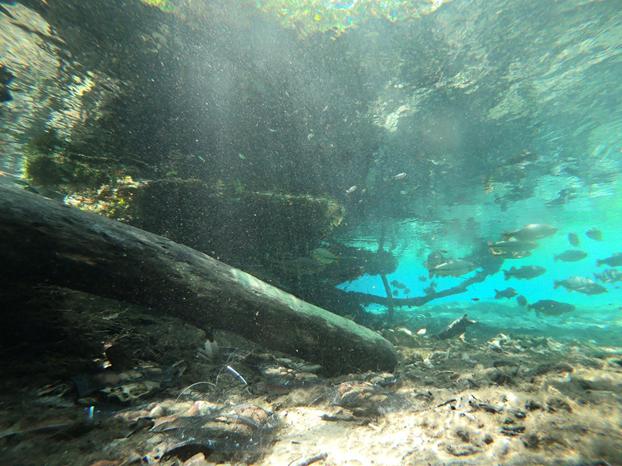Davidson Gomes Nogueira
The Bodoquena Plateau is a transitional region between Cerrado and Atlantic Forest hotspots, in south-western Brazil. One of its peculiar feature is its karstic waters, turning them crystal clear. However, the region has been experiencing rapid land uses changes in the last decade. These changes also alter the characteristics of the water and threaten the aquatic community. Our goals are to evaluate ecological interactions between forest and water, particularly the influence of fallen-fruits on aquatic biodiversity, and how changing the aquatic community affects ecosystem services. Based on our results, we will dialogue with stakeholders, local people and students to think about strategies to conciliate agriculture production, tourism and biodiversity in the region.

We will evaluate the ecological interactions between forest and streams, particularly the influence of fallen-fruits on aquatic biodiversity and food webs. We will be running three complementary experiments.
The first is an experiment on effects of fruit-fall on fish distribution to determine whether fruit availability dictates macroconsumers spatial distribution. We will assess fish distributions in ten transects in different streams where we can record daily species distribution. After a five-day community assessment, we will simulate fruit-fall by placing fruits on the transects and the assessment will continue until the tenth day.
The second experiment focus on measuring fruit consumption rates bin different habitats. We will test whether fruit-consumption rate changes with different locations within each stream channel.
In ten sampling sites with pools of similar depth and width, we will place fruits at the bottom of the deepest part and record for fifteen minutes the consumption of the fruits. We will repeat the same procedure close to the edge of the stream, for all ten streams.
The third experiment is the exclusion of macroconsumers, where we will evaluate whether macroconsumers control benthic invertebrate community associated to fruits in decomposition.
We will use an electrical exclusion technique to manipulate the access of macroconsumers to patches of benthic habitat for a 25-day period. This method has been widely employed to prevent macroconsumers from accessing the fruit substrate while allowing benthic invertebrates’ access.
While we run the experiments, we will start working with the local community conservation awareness. And to do so, we are going to start a “Citizen Science Kids” project to inspire kids from the community on conservation. We will train them to evaluate streams condition from the invertebrate fauna in class and then put it to practice on the field.
Along with the training of the kids, we are going to offer teachers and tour guides mini-courses on the role of fish and invertebrates on ecological networks.
We will also present the whole project and the results from the experiments to stakeholders in the region to show the importance of preserving riverscapes and what happens to their own region when preservation is not of major concern. We also will try working out the best way to promote production conciliated to conservation, not only of forest but also of biodiversity.
At the end, we will produce a short video to communicate the results in order to promote more conservation programs.